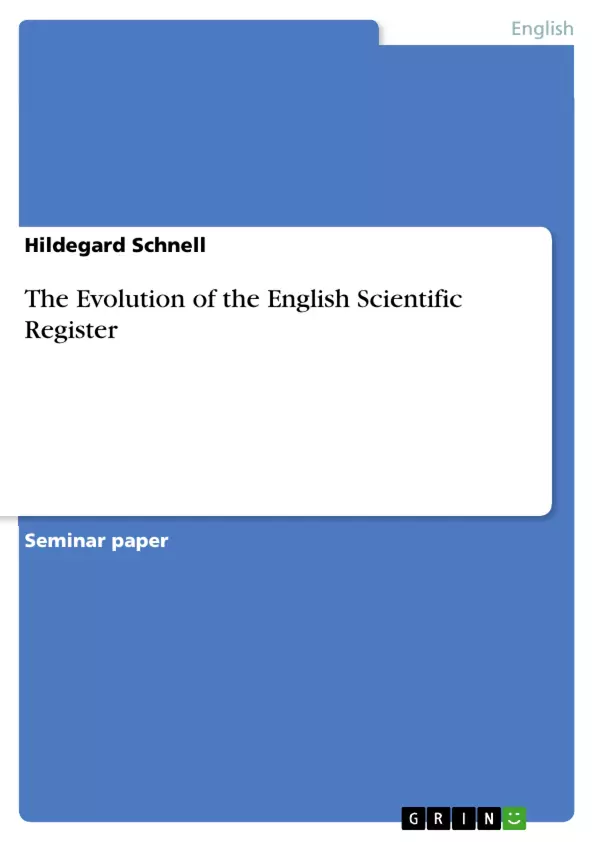Between the early stages of scientific writing in the late Middle English period and today, there have been significant changes in the grammatical properties and the rhetorical strategies of scientific discourse. These developments had an influence on the style of scientific writing, resulting in the change from a narrative towards a more argumentative style. According to this, the purpose of the present essay is to consider, from a historical stance, the evolution of linguistic features in the English scientific register. Thus, the essay takes into account several examples of linguistic features which are characteristic of late Middle English and Early Modern English scientific writing. Based on these examples, it is further the aim of my essay to provide an overview of the evolution of the English scientific register concerning its grammatical properties and rhetorical strategies up to the present day.
Inhaltsverzeichnis (Table of Contents)
- Introduction
- The process of standardisation and vernacularisation from late Middle English to Early Modern English
- English versus Latin
- The role of translation
- Evolution of the English scientific register
- Term definition: SCIENTIFIC ENGLISH
- Contextual dimensions in the production and transmission of early scientific writing
- Evolution of linguistic features in the organisation of scientific discourse
- Evolution of emotive features in scientific writing
- Evolution in the scale from learned to popular forms of scientific writing
- Evolution in patterns of agentivity and narrativity in scientific writing
- Evolution in the principles of botanical discourse organisation
- Evolution of scientific prose
- Conclusion
Zielsetzung und Themenschwerpunkte (Objectives and Key Themes)
This essay examines the evolution of the English scientific register from the late Middle English period to the present day. It aims to analyze the changes in grammatical properties and rhetorical strategies that occurred during this period, focusing on the shift from narrative to argumentative styles in scientific writing.
- The process of standardisation and vernacularisation of English
- The influence of Latin on English scientific writing
- The evolution of linguistic features in scientific discourse, including emotive features, the scale from learned to popular forms, patterns of agentivity and narrativity, and the principles of botanical discourse organisation
- The development of a distinct scientific prose style
- The role of translation in shaping the English scientific register
Zusammenfassung der Kapitel (Chapter Summaries)
The introduction provides an overview of the essay's objectives and the key themes that will be explored. It highlights the shift in scientific writing from a narrative to a more argumentative style during the period under study.
The second chapter examines the process of standardisation and vernacularisation of English from late Middle English to Early Modern English. It discusses the influence of West Saxon, the Norman Conquest, and the rise of the Chancery Standard. This section also analyzes the influence of Latin on English scientific writing.
Chapter three delves into the evolution of the English scientific register, defining the term "scientific English" and exploring the contextual dimensions of early scientific writing. The chapter further examines the evolution of linguistic features in the organisation of scientific discourse, including changes in emotive features, the scale from learned to popular forms, patterns of agentivity and narrativity, and the principles of botanical discourse organisation.
Chapter four focuses on the evolution of scientific prose, exploring the development of a distinct style of scientific writing.
Schlüsselwörter (Keywords)
This essay focuses on the evolution of the English scientific register, exploring key themes such as standardisation and vernacularisation, Latin influence, linguistic features, scientific prose, and the role of translation.
Frequently Asked Questions
How has English scientific writing changed since the Middle Ages?
Scientific discourse has evolved from a narrative style to a more argumentative style, with significant changes in grammatical properties and rhetorical strategies.
What role did Latin play in the evolution of scientific English?
Latin was the dominant language of science; the process of vernacularisation involved translating Latin concepts into English and standardizing the English scientific register.
What is meant by the "standardisation and vernacularisation" of English?
It refers to the transition from late Middle English to Early Modern English, where English became a standardized language capable of expressing complex scientific ideas previously reserved for Latin.
How did agentivity and narrativity change in scientific texts?
Early scientific writing was often more personal and narrative (story-like); over time, it became more objective, focusing on the experiment and results rather than the individual observer.
What are "emotive features" in historical scientific writing?
These are linguistic markers that express the author's feelings or stance. The essay tracks how these features have decreased as scientific prose became more detached and formal.
Why is botanical discourse mentioned specifically?
The essay uses botanical discourse as a specific example to illustrate how the principles of organizing scientific information evolved over centuries.
- Citation du texte
- Hildegard Schnell (Auteur), 2009, The Evolution of the English Scientific Register, Munich, GRIN Verlag, https://www.grin.com/document/128944



